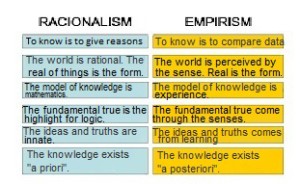
Arquivo para July 18th, 2016
(Português) Empirismo é racionalismo ?
Following our author-guide Peter Kreeft in his imaginary Socrates’ dialogue with Hume, now Socrates ask about the method and what is true for Hume, trying to show it as rationalist, to Hume says it is not, Socrates replies:
with Hume, now Socrates ask about the method and what is true for Hume, trying to show it as rationalist, to Hume says it is not, Socrates replies:
“SOCRATES: In his epistemological theory, yes, but not his method. Your method, like theirs, is to reduce or data to explain the complex to the simple, the rich variety of experience to simple universal formulas. HUME: But this is just one of the elements of the scientific method. SOCRATES: And this means that it should be an element of philosophical method?
HUME: There is nothing absolutely true or false with respect to a method … a method is just a tool, a practical means in order to find the truth. What we should discuss is about true.
SOCRATES: I agree. But it can not be true that the scientific method is not suitable for the philosopher an unscientific method to a scientist?
HUME: And that would use method to compare the scientific method to any other method? SOCRATES: I would use the universal method of logic.
HUME: Fair enough.
SOCRATES: And I say that reductionism violates the laws of logic.” (Kreeft, 2012).
The reductionism is the basis of rationalism and empiricism also, this is a simplification of reality in formulas and processes apparently explained, but they are complex.
The theme is earlier modernity in the late Middle Ages, the English nominalist William Ockham created the method “between two explanations choose the simplest,” and because of it it became known as Razor Ockham.

